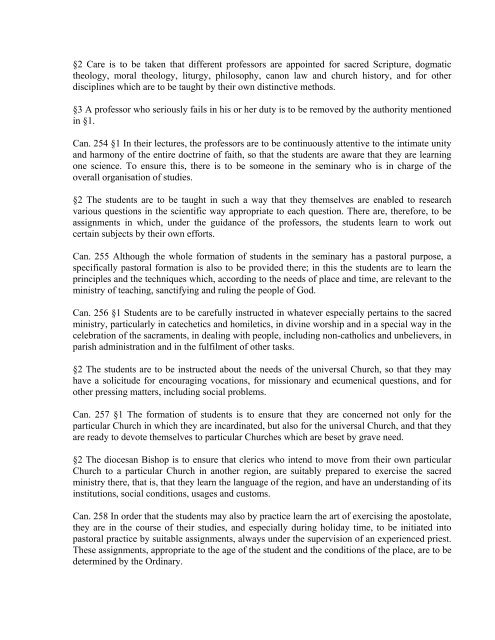Code_of_Canon_Law
Code_of_Canon_Law
Code_of_Canon_Law
Create successful ePaper yourself
Turn your PDF publications into a flip-book with our unique Google optimized e-Paper software.
§2 Care is to be taken that different pr<strong>of</strong>essors are appointed for sacred Scripture, dogmatic<br />
theology, moral theology, liturgy, philosophy, canon law and church history, and for other<br />
disciplines which are to be taught by their own distinctive methods.<br />
§3 A pr<strong>of</strong>essor who seriously fails in his or her duty is to be removed by the authority mentioned<br />
in §1.<br />
Can. 254 §1 In their lectures, the pr<strong>of</strong>essors are to be continuously attentive to the intimate unity<br />
and harmony <strong>of</strong> the entire doctrine <strong>of</strong> faith, so that the students are aware that they are learning<br />
one science. To ensure this, there is to be someone in the seminary who is in charge <strong>of</strong> the<br />
overall organisation <strong>of</strong> studies.<br />
§2 The students are to be taught in such a way that they themselves are enabled to research<br />
various questions in the scientific way appropriate to each question. There are, therefore, to be<br />
assignments in which, under the guidance <strong>of</strong> the pr<strong>of</strong>essors, the students learn to work out<br />
certain subjects by their own efforts.<br />
Can. 255 Although the whole formation <strong>of</strong> students in the seminary has a pastoral purpose, a<br />
specifically pastoral formation is also to be provided there; in this the students are to learn the<br />
principles and the techniques which, according to the needs <strong>of</strong> place and time, are relevant to the<br />
ministry <strong>of</strong> teaching, sanctifying and ruling the people <strong>of</strong> God.<br />
Can. 256 §1 Students are to be carefully instructed in whatever especially pertains to the sacred<br />
ministry, particularly in catechetics and homiletics, in divine worship and in a special way in the<br />
celebration <strong>of</strong> the sacraments, in dealing with people, including non-catholics and unbelievers, in<br />
parish administration and in the fulfilment <strong>of</strong> other tasks.<br />
§2 The students are to be instructed about the needs <strong>of</strong> the universal Church, so that they may<br />
have a solicitude for encouraging vocations, for missionary and ecumenical questions, and for<br />
other pressing matters, including social problems.<br />
Can. 257 §1 The formation <strong>of</strong> students is to ensure that they are concerned not only for the<br />
particular Church in which they are incardinated, but also for the universal Church, and that they<br />
are ready to devote themselves to particular Churches which are beset by grave need.<br />
§2 The diocesan Bishop is to ensure that clerics who intend to move from their own particular<br />
Church to a particular Church in another region, are suitably prepared to exercise the sacred<br />
ministry there, that is, that they learn the language <strong>of</strong> the region, and have an understanding <strong>of</strong> its<br />
institutions, social conditions, usages and customs.<br />
Can. 258 In order that the students may also by practice learn the art <strong>of</strong> exercising the apostolate,<br />
they are in the course <strong>of</strong> their studies, and especially during holiday time, to be initiated into<br />
pastoral practice by suitable assignments, always under the supervision <strong>of</strong> an experienced priest.<br />
These assignments, appropriate to the age <strong>of</strong> the student and the conditions <strong>of</strong> the place, are to be<br />
determined by the Ordinary.












![[Pham_Sherisse]_Frommer's_Southeast_Asia(Book4You)](https://img.yumpu.com/38206466/1/166x260/pham-sherisse-frommers-southeast-asiabook4you.jpg?quality=85)




